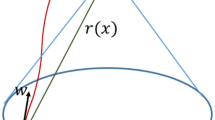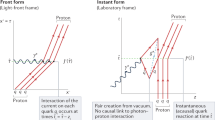Abstract
THE radial free fall motion of a charged body in a gravitational field is calculated here. A simple approach is presented, which includes the effects of the electrostatic and gravitational field energies of the falling body. The result shows that the acceleration is dependent on both mass and charge of the falling body and that both gravitational and electrostatic field energies gravitate repulsively, indicating that bodies of larger mass or larger charge will fall more slowly than bodies of lesser mass or smaller charge. Thus Einstein's principle of equivalence is not valid, as it requires that all physical systems experience the same acceleration of gravity. The approach also shows the difference between inertial and gravitational mass in a gravitational field.
This is a preview of subscription content, access via your institution
Access options
Subscribe to this journal
Receive 51 print issues and online access
$199.00 per year
only $3.90 per issue
Buy this article
- Purchase on Springer Link
- Instant access to full article PDF
Prices may be subject to local taxes which are calculated during checkout
Similar content being viewed by others
References
Ohanian, H. Gravitation and Spacetime (Norton, New York, 1976).
Fulton, T. & Rohrlich, F. Ann. Phys. 9, 499 (1960).
Rohrlich, F. Ann. Phys. 22, 169 (1963).
Ginzburg, V. L. Sov. Phys. Usp. 12, 565 (1970).
Nordtvedt, J. K. Im. J. theor. Phys. 3, 133 (1970).
Lightman, P. & Lee, D. L. Phys. Rev. D8, 364 (1973).
DeWitt, B. S. & Brehme, R. W. Ann. Phys. 9, 220 (1960).
Hobbs, J. M. Ann. Phys. 47, 141 (1968).
DeWitt, C. M. & DeWitt, B. S. Physics 1, 3 (1964).
Bazanski, S. Acta phys. pol. 15, 363 (1956); 16, 423 (1957).
Khan, A. R. & O'Connell, R. F. Nature 261, 480 (1976).
Einstein, A., Infeld, L. & Hoffman, B. Ann. Math. 39, 65 (1938).
Darwin, C. G. Phil. Mag. 39, 537 (1920).
Landau, L. D. & Lifshitz, E. M. The Classical Theory of Fields (Pergamon, Oxford, 1971).
Eötvös, R. V., Pekar, D. & Fekete, E. Ann. Phys. 68, 11 (1922).
Roll, P. G., Krotkov, R. & Dicke, R. H. Ann. Phys. 26, 442 (1964).
Braginsky, V. B. & Panov, V. L. Sov. Phys. JEPT 34, 463 (1972).
Einstein, A. Grundzüge der Relativitatstheorie (Vieweg, Braunschweig, 1969).
Treder, H.-J. Über Prinzipien der Dynamik von Einstein. Hertz, Mach und Poincaré. (Akademie, Berlin, 1974).
Author information
Authors and Affiliations
Rights and permissions
About this article
Cite this article
MCGRUDER, C. Field energies and principles of equivalence. Nature 272, 806–807 (1978). https://doi.org/10.1038/272806a0
Received:
Accepted:
Published:
Issue Date:
DOI: https://doi.org/10.1038/272806a0
Comments
By submitting a comment you agree to abide by our Terms and Community Guidelines. If you find something abusive or that does not comply with our terms or guidelines please flag it as inappropriate.



